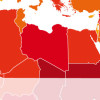This year, Anti-Corruption day (9th December) fell on a Sunday. Sunday is an incredibly awkward day for any kind of commemoration in Kenya because many Kenyans consider Sunday a day of worship and rest. With this in mind Transparency International Kenya adjusted the commemoration to five day anti-corruption caravans in three regions of the country […]

Kenya: performing arts pass anti-corruption message

Ugandan politicians, communities sign pact against corruption
We told communities to pick their own development agenda, then asked local politicians to commit to fulfilling that agenda. People were able to pick the issues that matter to them, and clearly described what they expect their leaders to deliver.

What Billions In Illicit And Licit Capital Flight Means For The People Of Zambia
A forthcoming report by Global Financial Integrity finds that Zambia lost US$8.8 billion in illicit financial outflows from 2001-2010

Beating bribery: International Anticorruption Day in Morocco
Drummers and dancers filled the streets of Casablanca as part of International Anticorruption Day festivities organized by our chapter Transparency Maroc. In a youth led project called Paroles urgentes or fast words to raise awareness about corruption through music, dance and theatre hundreds of people turned out to support this message. The street theatre facilitators […]

Anti-Corruption Day in South Africa: counting the cost of freedom
Yesterday in Soweto’s world-famous Regina Mundi church, beneath a stained-glass image of Nelson Mandela, worshippers spoke out against the country’s current crop of leaders – particularly, those who’ve been at the heart of headline-grabbing corruption scandals in recent months. “It’s becoming more corrupt every day … and it’s growing worse,” said Sidney Matlana, a member […]

Corruption: An ongoing revolution in the Arab world
The Arab world witnessed unprecedented changes with the toppling of dictators in Tunisia, Egypt and Libya last year. The Arab Spring served to transform the anti-corruption issue from the responsibility of a few, to the preoccupation of many. In most countries in the Middle East and North Africa region, trust in government remains low, with […]

Corruption Perceptions Index 2012 demands a new tack in Afghanistan
The recent independent report on Kabul Bank scandal points out to the urgency to transform the country’s laws and institutions, from the financial sector to the justice system. The team that published the report are to be congratulated for shedding light on a “ponzi scheme” scandal that involves the theft of US$900 million. It is […]

What the Corruption Perceptions Index means in different languages
We will publish the 2012 Corruption Perceptions Index next Wednesday 5 December. Behind the scores are many different kinds of public sector corruption, all with their own impact on daily life. Our evidence is language. Every language has its own particular expression for abuse of power. Here are a few. In English, we refer to […]

Morocco’s youth prepares for Anti-Corruption Day 2012
Gearing up to International Anti-Corruption Day (9 December), Transparency Morocco is using art to work with youth in raising awareness about anticorruption. Paroles Urgentes is an artistic combination of street theatre, breakdancing, slam poetry and music. See an ad for the event organised by our Chapter below: Meaning ‘fast words’ the project refers to the […]

What stops women reporting corruption?
When asked whether corruption is a problem for women, I immediately think about the women in a local hospital who were being charged US$ 5 every time they screamed while giving birth. The impact of corruption on women is under-researched and hard to document because it is not easy for women to come forward and […]
- State Capture in South Africa 14 February 2017
-
 What’s next for Ukraine?
16 December 2016
What’s next for Ukraine?
16 December 2016
-
 Cleaning up sport: conflicts of interest at the top
9 December 2016
Cleaning up sport: conflicts of interest at the top
9 December 2016
-
 OGP: France must do more to tackle corruption
9 December 2016
OGP: France must do more to tackle corruption
9 December 2016
-
 Pharma companies in Slovakia: Uncovering conflicts of interest
9 December 2016
Pharma companies in Slovakia: Uncovering conflicts of interest
9 December 2016
-
Nokubonga Ndima: Young people can make a change for a better future...
-
Benjamin M: Very good article! Congrats!...
-
arun kottur: In India sports minister was involved decades are ...
-
Ekonomi: Very beneficial article. Thank you very much. htt...
-
ksweeney1: I do not agree that https://apex.aero/2016/09/22/g...
Search
Categories
Latest news from Transparency International
No items, feed is empty.

 Connect with us on Facebook
Connect with us on Facebook Follow us on Twitter
Follow us on Twitter